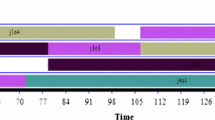Abstract
Production scheduling has a considerable impact on productivity and resource assignment. In many situations, every job has an owner, which is called an agent. Since the agents are independent and selfish, it is possible that they have not any incentive to cooperate. Scheduling games help us to understand interactions between the agents. In this study, we consider a real firm with a flow shop manufacturing system that receives various orders from different agents so that each order belongs to a unique agent and includes some jobs. We propose a Nash bargaining model to find a compromise solution among agents. We suppose the utilities of the agents in disagreement point are non-deterministic. Therefore, to overcome this problem, we used linear programming with interval coefficients in order to find the best and the worst Nash bargaining solution. To find a compromised solution, we propose an improved genetic algorithm and compare it with other meta-heuristic algorithms. The comparisons indicate that the proposed algorithm has a good potential to evaluation of Nash bargaining problem in hybrid flow shop environment. Based on the results to reach an agreement between agents, it is required to create a trade-off between usage rates of fastest machines at each stage especially in bottleneck stages and total processing time of orders. The results indicate that the Nash bargaining solution is suitable to solve real-life agent-based production scheduling with the consideration of interactions among the agents when disagreement points are under uncertainty.
Similar content being viewed by others
References
Safari E, Sadjadi J (2011) A hybrid method for flowshops scheduling with condition-based maintenance. Expert Syst Appl 38(3):2020–2029. https://doi.org/10.1016/j.eswa.2010.07.138
Li J, Tao F, Cheng Y, Zhao L (2015) Big data in product lifecycle management. Int J Adv Manuf Technol 81(1–4):667–684. https://doi.org/10.1007/s00170-015-7151-x
Jia W, Jiang Z, Li Y (2015) Scheduling to minimize the makespan in large-piece one-of-a-kind production with machine availability constraints. Expert Syst Appl 42(23):9174–9182. https://doi.org/10.1016/j.eswa.2015.08.012
Mokhtari H, Dadgar M (2015) Scheduling optimization of a stochastic flexible job-shop system with time-varying machine failure rate. Comput Oper Res 61:31–45. https://doi.org/10.1016/j.cor.2015.02.014
Papadimitriou C (2001) Algorithms, games, and the internet. In: In symposium on theory of computing STOC, pp 749–753
Lin L, Tan Z (2014) Inefficiency of Nash equilibrium for scheduling games with constrained jobs: a parametric analysis. Theor Comput Sci 521:123–134. https://doi.org/10.1016/j.tcs.2013.11.012
Nash JF (1950) The bargaining problem. Econometrica 18(2):155–162. https://doi.org/10.2307/1907266
Yaacoub E, Dawy Z (2011) Achieving the Nash bargaining solution in OFDMA uplink using distributed scheduling with limited feedback. AEU – Int J of Electron Commun 65(4):320–330. https://doi.org/10.1016/j.aeue.2010.03.007
Epstein L, Feldman M, Tamir T, Witkowski Ł, Witkowski M (2013) Approximate strong equilibria in job scheduling games with two uniformly related machines. Discret Appl Math 161(13-14):1843–1858. https://doi.org/10.1016/j.dam.2013.02.035
Feldman M (2008) Approximate strong equilibrium in job scheduling games. In: Monien B, Schroeder U-P (eds) Algorithmic game theory: first international symposium, SAGT 2008, Paderborn, Germany, April 30-May 2, 2008. Proceedings. Springer Berlin Heidelberg, Berlin, Heidelberg, pp 58–69. doi:https://doi.org/10.1007/978-3-540-79309-0_7
Zhou G, Jiang P, Huang GQ (2009) A game-theory approach for job scheduling in networked manufacturing. Int J Adv Manuf Technol 41(9):972–985. https://doi.org/10.1007/s00170-008-1539-9
Spata MO, Rinaudo S (2012) A job scheduling game based on a folk algorithm. In: Greco S, Bouchon-Meunier B, Coletti G, Fedrizzi M, Matarazzo B, Yager RR (eds) Advances in computational intelligence: 14th International Conference on Information Processing and Management of Uncertainty in Knowledge-Based Systems, IPMU 2012, Catania, Italy, July 9–13, 2012, Proceedings, Part IV. Springer Berlin Heidelberg, pp 622–631. doi:https://doi.org/10.1007/978-3-642-31724-8_65
Thang NK (2013) NP-hardness of pure Nash equilibrium in scheduling and network design games. Theor Comput Sci 482:86–95. https://doi.org/10.1016/j.tcs.2012.10.051
(2014) A game-theoretic approach for the web services scheduling problem. Expert Systems with Applications 41:4743–4751
Hassin R, Yovel U (2015) Sequential scheduling on identical machines. Oper Res Lett 43(5):530–533. https://doi.org/10.1016/j.orl.2015.08.003
Xie F, Zhang Y, Bai Q, Xu Z (2015) Inefficiency analysis of the scheduling game on limited identical machines with activation costs. Inf Process Lett 15
Cole R, Correa JR, Gkatzelisa V, Mirrokni V, Olver N (2015) Decentralized utilitarian mechanisms for scheduling games. Games Econ Behav 92:306–326. https://doi.org/10.1016/j.geb.2013.03.011
Du B, Guo S (2016) Production planning conflict resolution of complex product system in group manufacturing: a novel hybrid approach using ant colony optimization and Shapley value. Comput Ind Eng 94:158–169. https://doi.org/10.1016/j.cie.2015.12.015
Nong Q-Q, Guo S-J, Miao L-H (2016) The shortest first coordination mechanism for a scheduling game with parallel-batching machines. J Oper Res Soc China 4(4):517–527. https://doi.org/10.1007/s40305-016-0134-2
Gan X, Gu Y, Vairaktarakis GL, Cai X, Chen Q (2007) A scheduling problem with one producer and the bargaining counterpart with two producers. In: Chen B, Paterson M, Zhang G (eds) Combinatorics, algorithms, probabilistic and experimental methodologies: First International Symposium, ESCAPE 2007, Hangzhou, China, April 7–9, 2007, Revised Selected Papers. Springer Berlin Heidelberg, Berlin, Heidelberg, pp 305–316. doi:https://doi.org/10.1007/978-3-540-74450-4_28
Suh S-C, Wen Q (2006) Multi-agent bilateral bargaining and the Nash bargaining solution. J Math Econ 42(1):61–73. https://doi.org/10.1016/j.jmateco.2005.06.001
Touati C, Altman E, Galtier J (2006) Generalized Nash bargaining solution for bandwidth allocation. Comput Netw 50(17):3242–3263. https://doi.org/10.1016/j.comnet.2005.12.006
Lippman SA, McCardle KF, Tang CS (2013) Using Nash bargaining to design project management contracts under cost uncertainty. Int J Prod Econ 145(1):199–207. https://doi.org/10.1016/j.ijpe.2013.04.036
Wang M, Li Y (2014) Supplier evaluation based on Nash bargaining game model. Expert Syst Appl 41(9):4181–4185. https://doi.org/10.1016/j.eswa.2013.12.044
Kerachian R, Fallahnia M, Bazargan-Lari MR, Mansoori A, Sedghi H (2010) A fuzzy game theoretic approach for groundwater resources management: application of Rubinstein Bargaining Theory. Resour Conserv Recycl 54(10):673–682. https://doi.org/10.1016/j.resconrec.2009.11.008
Hawkins WB (2015) Bargaining with commitment between workers and large firms. Rev Econ Dyn 18(2):350–364. https://doi.org/10.1016/j.red.2014.06.003
Hamidi M, Liao H (2017) Maintenance outsourcing contracts based on bargaining theory. In: Matsumoto A (ed) Optimization and Dynamics with Their Applications: Essays in Honor of Ferenc Szidarovszky. Springer Singapore, Singapore, pp 257–279. doi:https://doi.org/10.1007/978-981-10-4214-0_12
Chen JC, Wu CC (2012) Flexible job shop scheduling with parallel machine susing genetic algorithm and grouping genetic algorithm. Exp Syst Appl 39:10016–10021
Chiang TS, Lin HJ (2013) A simple and effective evolutionary algorithm for multiobjective flexible job shop scheduling. Int J Prod Econ 141:87–98
Xiong J, Xing LN, Chen YW (2013) Robust scheduling for multi-objective flexible job shop problems with random machine break downs. Int J Prod Econ 141
Costa A, Cappadonna FA, Fichera S (2014) A novel genetic algorithm for the hybrid flow shop scheduling with parallel batching and eligibility constraints. Int J Adv Manuf Technol 75(5–8):833–847
Driss I, Mouss KN, Laggoun A (2015) A new genetic algorithm for flexible job-shop scheduling problems. J Mech Sci Technol 29(3):1273–1281
Jun S, Park J (2015) A hybrid genetic algorithm for the hybrid flow shop scheduling problem with nighttime work and simultaneous work constraints: a case study from the transformer industry. Expert Syst Appl 42(15-16):6196–6204. https://doi.org/10.1016/j.eswa.2015.03.012
Li X, Gao L (2016) An effective hybrid genetic algorithm and tabu search for flexible job shop scheduling problem. Int J Prod Econ 174:93–110
B Naderi, S Gohari, M Yazdani (2014) Hybrid flexible flowshop problems: models and solution methods. Applied Mathematical Modelling
Nash J (1953) Two-person cooperative games. Econometrica 21(1):128–140. https://doi.org/10.2307/1906951
Peters H (2015) Game theory: a multi-leveled approach. Springer, DOI: https://doi.org/10.1007/978-3-662-46950-7,
Mas-Colell A, Whinston MD, Green JR (1995) Microeconomic theory, vol 1. Oxford University Press, New York
Chinneck JW, Ramadan K (2000) Linear programming with interval coefficients. J Oper Res Soc 51(2):209–220. https://doi.org/10.1057/palgrave.jors.2600891
Kelly FP, Maulloo AK, Tan DK (1998) Rate control for communication networks: shadow prices, proportional fairness and stability. J Oper Res Soc 49(3):237–252. https://doi.org/10.1057/palgrave.jors.2600523
Gupta JND (1988) Two-stage, hybrid flowshop scheduling problem. J Oper Res Soc 39(4):359–364. https://doi.org/10.1057/jors.1988.63
Lenstra JK, Rinnooy Kan AHG, Brucker P (1977) Complexity of machine scheduling problems. Ann Discrete Math 1(1):343–362. https://doi.org/10.1016/S0167-5060(08)70743-X
Abdollahpour S, Rezaeian J (2015) Minimizing makespan for flow shop scheduling problem with intermediate buffers by using hybrid approach of artificial immune system. Appl Soft Comput 28:44–56. https://doi.org/10.1016/j.asoc.2014.11.022
de Souza CDR, D’Agosto MA (2013) Value chain analysis applied to the scrap tire reverse logistics chain: an applied study of co-processing in the cement industry. Resour Conserv Recycl 78:15–25. https://doi.org/10.1016/j.resconrec.2013.06.007
Gupta V, Narayanamurthy G, Acharya P (2017) Can lean lead to green? Assessment of radial tyre manufacturing processes using system dynamics modelling. Comput Oper Res 89:284–306. https://doi.org/10.1016/j.cor.2017.03.015
Reid DR, Nada RS (2011) Operations management an integrated approach, vol 1. John Wiley & Sons Inc
Djatna T, Munichputranto F (2015) An analysis and design of mobile business intelligence system for productivity measurement and evaluation in tire curing production line. Procedia Manuf 4:438–444. https://doi.org/10.1016/j.promfg.2015.11.060
Tao, F., Cheng, J., Qi, Q., Zhang, M., Zhang, H., & Sui, F. (2017). Digital twin-driven product design, manufacturing and service with big data. Int J Adv Manuf Technol 1-14
Author information
Authors and Affiliations
Corresponding author
Rights and permissions
About this article
Cite this article
Safari, G., Hafezalkotob, A. & Khalilzadeh, M. A Nash bargaining model for flow shop scheduling problem under uncertainty: a case study from tire manufacturing in Iran. Int J Adv Manuf Technol 96, 531–546 (2018). https://doi.org/10.1007/s00170-017-1461-0
Received:
Accepted:
Published:
Issue Date:
DOI: https://doi.org/10.1007/s00170-017-1461-0




